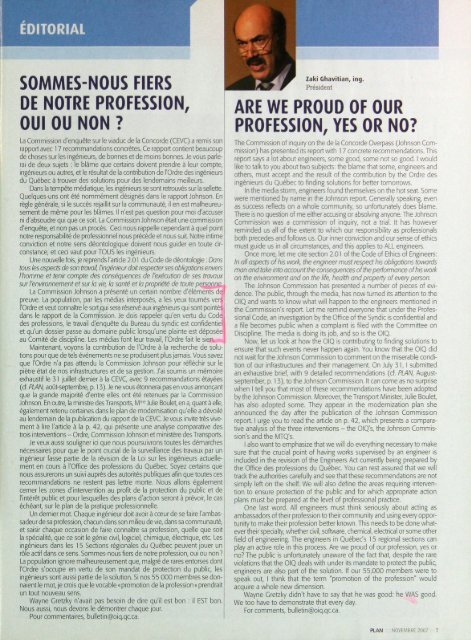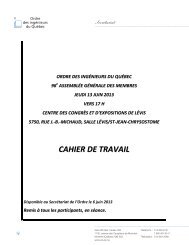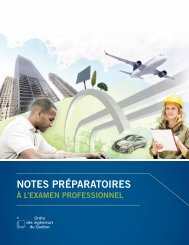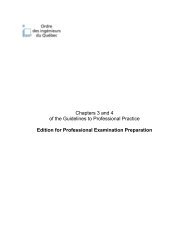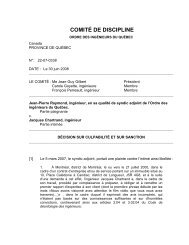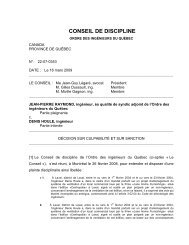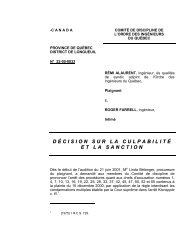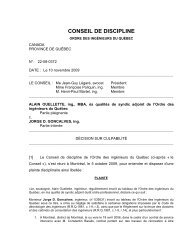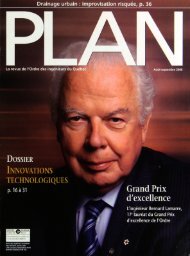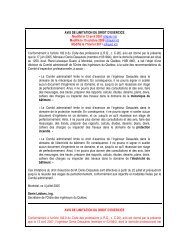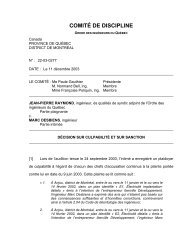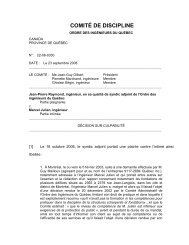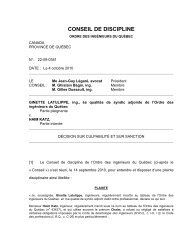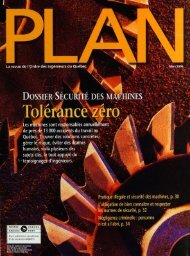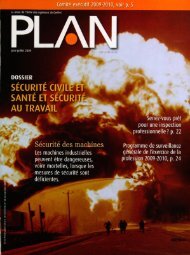PLAN 2007-8 - Ordre des ingénieurs du Québec
PLAN 2007-8 - Ordre des ingénieurs du Québec
PLAN 2007-8 - Ordre des ingénieurs du Québec
You also want an ePaper? Increase the reach of your titles
YUMPU automatically turns print PDFs into web optimized ePapers that Google loves.
V<br />
ÉDITORIAL<br />
SOMMES-NOUS FIERS<br />
DE NOTRE PROFESSION,<br />
OUI OU NON ?<br />
La Commission d'enquête sur le via<strong>du</strong>c de la Concorde (CEVC) a remis son<br />
rapport avec 17 recommandations concrètes. Ce rapport contient beaucoup<br />
de choses sur les <strong>ingénieurs</strong>, de bonnes et de moins bonnes. Je vous parlerai<br />
de deux sujets : le blâme que certains doivent prendre à leur compte,<br />
<strong>ingénieurs</strong> ou autres, et le résultat de la contribution de l'<strong>Ordre</strong> <strong>des</strong> <strong>ingénieurs</strong><br />
<strong>du</strong> <strong>Québec</strong> à trouver <strong>des</strong> solutions pour <strong>des</strong> lendemains meilleurs.<br />
Dans la tempête médiatique, les <strong>ingénieurs</strong> se sont retrouvés sur la sellette.<br />
Quelques-uns ont été nommément désignés dans le rapport Johnson. En<br />
règle générale, si le succès rejaillit sur la communauté, il en est malheureusement<br />
de même pour les blâmes. Il n'est pas question pour moi d'accuser<br />
ni d'absoudre qui que ce soit. La Commission Johnson était une commission<br />
d'enquête, et non pas un procès. Ceci nous rappelle cependant à quel point<br />
notre responsabilité de professionnel nous précède et nous suit Notre intime<br />
conviction et notre sens déontologique doivent nous guider en toute circonstance,<br />
et ceci vaut pour TOUS les <strong>ingénieurs</strong>.<br />
Une nouvelle fois, je reprends l'article 2.01 <strong>du</strong> Code de déontologie : Dans<br />
tous les aspects de son travail, l'ingénieur doit respecter ses obligations envers<br />
l'homme et tenir compte <strong>des</strong> conséquences de l'exécution de ses travaux<br />
sur l'environnement et sur la vie, la santé et la propriété de toute personne.<br />
La Commission Johnson a présenté un certain nombre d'éléments de<br />
preuve. La population, par les médias interposés, a les yeux tournés vers<br />
l'<strong>Ordre</strong> et veut connaître le soit qui sera réservé aux <strong>ingénieurs</strong> qui sont pointés<br />
dans le rapport de la Commission. Je dois rappeler qu'en vertu <strong>du</strong> Code<br />
<strong>des</strong> professions, le travail d'enquête <strong>du</strong> Bureau <strong>du</strong> syndic est confidentiel<br />
et qu'un dossier passe au domaine public lorsqu'une plainte est déposée<br />
au Comité de discipline. Les médias font leur travail, l'<strong>Ordre</strong> fait le sien.<br />
Maintenant, voyons la contribution de l'<strong>Ordre</strong> à la recherche de solutions<br />
pour que de tels événements ne se pro<strong>du</strong>isent plus jamais. Vous savez<br />
que l'<strong>Ordre</strong> n'a pas atten<strong>du</strong> la Commission Johnson pour réfléchir sur le<br />
piètre état de nos infrastructures et de sa gestion. J'ai soumis un mémoire<br />
exhaustif le 31 juillet dernier à la CEVC, avec 9 recommandations étayées<br />
(cf. <strong>PLAN</strong>, août-septembre, p. 13). Je ne vous étonnerai pas en vous annonçant<br />
que la grande majorité d'entre elles ont été retenues par la Commission<br />
Johnson. En outre, la ministre <strong>des</strong> Transports, M Julie Boulet, en a, quant à elle,<br />
également retenu certaines dans le plan de modernisation qu'elle a dévoilé<br />
au lendemain de la publication <strong>du</strong> rapport de la CEVC Je vous invite très vivement<br />
à lire l'article à la p. 42, qui présente une analyse comparative <strong>des</strong><br />
trois interventions - <strong>Ordre</strong>, Commission Johnson et ministère <strong>des</strong> Transports.<br />
Je veux aussi souligner ici que nous poursuivrons toutes les démarches<br />
nécessaires pour que le point crucial de la surveillance <strong>des</strong> travaux par un<br />
ingénieur fasse partie de la révision de la Loi sur les <strong>ingénieurs</strong> actuellement<br />
en cours à l'Office <strong>des</strong> professions <strong>du</strong> <strong>Québec</strong>. Soyez certains que<br />
nous assurerons un suivi auprès <strong>des</strong> autorités publiques afin que toutes ces<br />
recommandations ne restent pas lettre morte. Nous allons également<br />
cerner les zones d'intervention au profit de la protection <strong>du</strong> public et de<br />
l'intérêt public et pour lesquelles <strong>des</strong> plans d'action seront à prévoir, le cas<br />
échéant, sur le plan de la pratique professionnelle.<br />
Un dernier mot. Chaque ingénieur doit avoir à cœur de se faire l'ambassadeur<br />
de sa profession, chacun dans son milieu de vie, dans sa communauté,<br />
et saisir chaque occasion de faire connaître sa profession, quelle que soit<br />
la spécialité, que ce soit le génie civil, logiciel, chimique, électrique, etc. Les<br />
<strong>ingénieurs</strong> dans les 15 Sections régionales <strong>du</strong> <strong>Québec</strong> peuvent jouer un<br />
rôle actif dans ce sens. Sommes-nous fiers de notre profession, oui ou non ?<br />
La population ignore malheureusement que, malgré de rares entorses dont<br />
l'<strong>Ordre</strong> s'occupe en vertu de son mandat de protection <strong>du</strong> public, les<br />
<strong>ingénieurs</strong> sont aussi partie de la solution. Si nos 55 000 membres se donnaient<br />
le mot, je crois que le vocable «promotion de la profession » prendrait<br />
un tout nouveau sens.<br />
Wayne Gretzky n'avait pas besoin de dire qu'il est bon : il EST bon.<br />
Nous aussi, nous devons le démontrer chaque jour.<br />
Pour commentaires, bulletin@oiq.qc.ca.<br />
I<br />
ARE WE PROUD OF OUR<br />
PROFESSION, YES OR NO?<br />
The Commission of inquiry on the de la Concorde Overpass (Johnson Commission)<br />
has presented its report with 17 concrete recommendations. This<br />
report says a lot about engineers, some good, some not so good. I would<br />
like to talk to you about two subjects: the blame that some, engineers and<br />
others, must accept and the result of the contribution by the <strong>Ordre</strong> <strong>des</strong><br />
<strong>ingénieurs</strong> <strong>du</strong> <strong>Québec</strong> to finding solutions for better tomorrows.<br />
In the media storm, engineers found themselves on the hot seat. Some<br />
were mentioned by name in the Johnson report Generally speaking, even<br />
as success reflects on a whole community, so unfortunately does blame.<br />
There is no question of me either accusing or absolving anyone. The Johnson<br />
Commission was a commission of inquiry, not a trial. It has however<br />
reminded us all of the extent to which our responsibility as professionals<br />
both prece<strong>des</strong> and follows us. Our inner conviction and our sense of ethics<br />
must guide us in all circumstances, and this applies to ALL engineers.<br />
Once more, let me cite section 2.01 of the Code of Ethics of Engineers:<br />
In all aspects of his work, the engineer must respect his obligations towards<br />
man and take into account the consequences of the performance of his work<br />
on the environment and on the life, health and property of every person.<br />
The Johnson Commission has presented a number of pieces of evidence.<br />
The public, through the media, has now turned its attention to the<br />
OIQ and wants to know what will happen to the engineers mentioned in<br />
the Commission's report. Let me remind everyone that under the Professional<br />
Code, an investigation by the Office of the Syndic is confidential and<br />
a file becomes public when a complaint is filed with the Committee on<br />
Discipline. The media is doing its job, and so is the OIQ.<br />
Now, let us look at how the OIQ is contributing to finding solutions to<br />
ensure that such events never happen again. You know that the OIQ did<br />
not wait for the Johnson Commission to comment on the miserable condition<br />
of our infrastructures and their management. On July 31,1 submitted<br />
an exhaustive brief, with 9 detailed recommendations (cf. <strong>PLAN</strong>, Augustseptember,<br />
p. 13), to the Johnson Commission. It can come as no surprise<br />
when I tell you that most of these recommendations have been adopted<br />
by the Johnson Commission. Moreover, the Transport Minister, Julie Boulet,<br />
has also adopted some. They appear in the modernization plan she<br />
announced the day after the publication of the Johnson Commission<br />
report. I urge you to read the article on p. 42, which presents a comparative<br />
analysis of the three interventions - the OIQ's, the Johnson Commission's<br />
and the MTQ's.<br />
I also want to emphasize that we will do everything necessary to make<br />
sure that the crucial point of having works supervised by an engineer is<br />
included in the revision of the Engineers Act currently being prepared by<br />
the Office <strong>des</strong> professions <strong>du</strong> <strong>Québec</strong>. You can rest assured that we will<br />
track the authorities carefully and see that these recommendations are not<br />
simply left on the shelf. We will also define the areas requiring intervention<br />
to ensure protection of the public and for which appropriate action<br />
plans must be prepared at the level of professional practice.<br />
One last word. All engineers must think seriously about acting as<br />
ambassadors of their profession to their community and using every opportunity<br />
to make their profession better known. This needs to be done whatever<br />
their specialty, whether civil, software, chemical, electrical or some other<br />
field of engineering. The engineers in <strong>Québec</strong>'s 15 regional sections can<br />
play an active role in this process. Are we proud of our profession, yes or<br />
no? The public is unfortunately unaware of the fact that, <strong>des</strong>pite the rare<br />
violations that the OIQ deals with under its mandate to protect the public,<br />
engineers are also part of the solution. If our 55,000 members were to<br />
speak out, I think that the term "promotion of the profession" would<br />
acquire a whole new dimension.<br />
Wayne Gretzky didn't have to say that he was good: he WAS good.<br />
We too have to demonstrate that every day.<br />
For comments, bulletin@oiq.qc.ca.<br />
<strong>PLAN</strong> : NOVEMBRE <strong>2007</strong> 7


